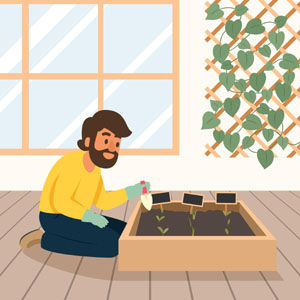Herbs are easy to grow and quite rewarding. As long as they have proper sunlight and water there will be plenty to use for recipes. You might even need to give your neighbor some as well. However, there are a few things that continually need to be done while caring for your herb garden.
The following are a few basic tips on care and maintaining your herb garden.
Watering
Herb gardens need to be watered regularly. Each herb has different requirements, but most enjoy a soil that is moist. If you have started an herb garden from containers, more than likely they will need to be watered daily as they tend to dry out faster. Keep an eye on the weather as that will also play a factor in how much watering needs to be done.
Weeding
As with any gardens, you need to keep up with the weeds. Weeds can destroy a garden by causing diseases and not allowing enough space for your herbs to grow. Weeds will also take over the water supply and cause the herbs to wilt. If there are any signs of weeds, pull them immediately.
Pruning
Believe it or not, these delicate plants need to be pruned. Well-pruned herbs will continue to grow year-round and prevent them from going to seed. Pruning keeps the garden well maintained and allows you to spot any pests or diseases trying to infiltrate your garden.
Harvesting and Relocating
When the weather starts to cool down, most herbs will need to be moved indoors. Some herbs such as mint, thyme, oregano, sage, and chives can survive the cooler months. To harvest these herbs, cut the leaves and stems, leaving about two inches of growth from the soil.
Feeding
Herbs generally do not need much attention when it comes to feeding them, but it is a good idea to test your soil first and follow the appropriate guidelines to have a healthy supply of herbs. Compost or organic fertilizers are best. For herbs grown in containers, use slow-release and water-soluble fertilizer.
Mulching
Add two to four inches of mulch around herbs to prevent the growth of weeds. When adding mulch to your garden, make sure to avoid the crown of the herb plant. Proper mulching will also regulate the soil temperature and help conserve moisture. Use organic materials such as grass clippings, shredded leaves or old compost.
Also see: Eight Reasons You Should Be Growing Your Own Herbs
Continue to follow these tips as you grow your herb garden, and you are sure to have a bountiful supply of herbs. Herbs are a great addition to foods and provide great health benefits, as most of them are anti-inflammatory and high in antioxidants.
